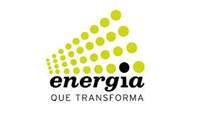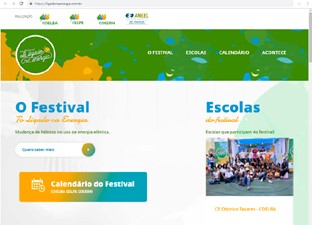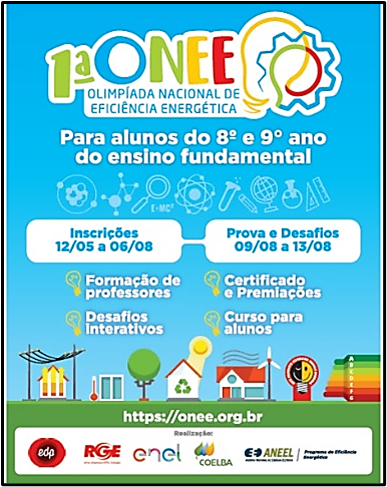Educational Projects
Our educational initiatives in the Energy Efficiency Program, regulated by the National Electric Energy Agency (Aneel), are exciting projects that aim to raise awareness about the efficient and safe use of electricity. With a variety of actions and partnerships, we are committed to educating students and teachers for a sustainable energy future.
Neoenergia's educational actions comprise 4 (four) strands:
- National Electricity Olympics
- Partnership with UNICEF
- Energy Classrooms
- Training Educators in the "Energy that Transforms" Methodology
National Energy Efficiency Olympics

The National Energy Efficiency Olympics (ONEE) is an ANEEL initiative aimed at promoting education about conscious energy consumption. Its 2025 edition is coordinated by the Abradee Institute and involves 48 energy distributors from all over the country, including the 5 distributors of the Neoenergia Group, joining forces to build a more conscious energy culture in line with the National Energy Efficiency Plan.
The ONEE is an excellent entry point into the world of scientific Olympiads. Outstanding students and teachers receive gold, silver and bronze medals and honorable mention certificates for 50% of participants. In addition, the ONEE offers medal-winning students automatic qualification for the 2nd phase of the National Science Olympiad (ONC) the following year, expanding their opportunities for academic recognition and participation in other national competitions.
The students enrolled in the competition are trained remotely in energy efficiency, covering energy concepts, electricity generation, development and efficiency of electricity production and consumption systems, through texts and lessons, with videos, activities and experiments, they take on challenges to use their knowledge of energy efficiency in practice and answer a test with objective questions on the subject.
For information on the rules, registration and calendar, visit ONEE - National Energy Efficiency Olympics.
Partnership with UNICEF
The partnership between Neoenergia and UNICEF aims to train managers, pedagogical coordinators and basic education teachers to engage students and broaden the repertoire of the school community in the development of authorial projects that strengthen curriculum development with a focus on climate change, energy efficiency and waste reuse.
Energy Classes Space
The Aulas de Energia spaces are interactive environments with technologies, experiments, models, panels and videos that promote immersive experiences through the use of electricity, energy generation and energy efficiency. Neoenergia has fixed spaces, mobile units that circulate around the concession area of its distributors and videos available on YouTube and digital material for educational support.
The fixed spaces are:
- Energy Museum, located in Salvador, Bahia.
- Espaço Aulas de Energia de Noronha, located on the island of Fernando de Noronha (post-retirement service started on August 28th, 2015).
- Espaço Aulas de Energia de Natal, located in Parque da Cidade (under installation with visitation scheduled to begin on September 23rd, 2015)
- Aneel's Energy Efficiency Museum, located at Aneel's headquarters in Brasília/DF (construction work to begin and expected to be completed by June 26)
The Mobile Educational Units are trucks adapted to serve public educational institutions in Bahia, Pernambuco, Rio Grande do Norte, São Paulo and Brasília, as well as the general public in the case of specific events.
Visits to the Aulas de Energia spaces are free, by prior appointment, and offer guided tours under the supervision of trained staff, favoring organic and meaningful learning.
Energy that Transforms
The Energy That Transforms methodology, created by the Roberto Marinho Foundation, Canal Futura and Procel, aims to train teachers to be a vector of communication with students. As well as working on the topic of the rational and safe use of energy, they are also given techniques and methodologies to use in the classroom: teachers are encouraged to create their own approach to transmitting this knowledge.

The training workshops are led by AVSI Brasil educators, who train the teachers, coordinators and pedagogical supervisors of the participating educational institutions in each registration territory. During the training course, lectures are given on Energy Efficiency, the Environment and Safety in the Use of Electricity, as well as training in new methodological practices, to update and appropriate the technical content linked to the project's theme.
The Energia Que Transforma methodology encourages the development of inter- and transdisciplinary activities focused on energy efficiency. The approach aims to integrate the knowledge acquired into the participants' daily lives, valuing interactivity and the use of playful methodologies to foster practical experiences. These experiences encourage the collaborative construction of new knowledge and the development of more conscious and sustainable social practices.
Check out our calendar of training courses below and find out how to take part.
|
PÓLO
|
PERIOD*
|
STATUS
|
REMARKS
|
|---|---|---|---|
|
Lauro de Freitas/BAl
|
30/Apr/2025
|
Completed
|
|
|
Recife/PE
|
14 and 16/May/25
|
Completed
|
|
|
Olinda/PE
|
20 and 21/May/25
|
Completed
|
|
|
Guarujá/SP
|
05 and 06/jun/25
|
Completed
|
|
|
Registro/SP
|
11 and 12/jun/25
|
Completed
|
|
|
Salvador/BA
|
29/jul/2025
|
Completed
|
Exclusive to Escola Mun Leovícia Andrade
|
|
Natal/RN
|
18 and 19/Oct/25
|
Registration closed
|
|
|
Natal/RN
|
21 and 22/Oct/25
|
Registration closed
|
|
|
Camaçari/BA
|
11 e 12/set/25
|
Registration closed
|
|
|
Brasília/DF
|
23 e 30/set/25
|
To be realized
|
Morning and afternoon classes Enrollment open or not. |
|
Brasília/DF
|
30/Sep and 02/Oct/25
|
To be realized
|
Morning and afternoon classes Enrollment open or not. |
|
Salvador/BA
|
04 and 05/Oct/25
|
To be realized
|
Exclusiva para o V CEIJMA. Inscrição por indicação da SEC/BA. |
|
Salvador/BA
|
21 and 22/Oct/25
|
To be realized
|
Exclusiva p/ Educadores Mun Codesal
|
|
Salvador/BA
|
23/Oct/25
|
To be realized
|
Exclusive to Codesal Community
|
Contatos:
(71) 99723-9642
E-mails:
Neoenergia Coelba: energiaquetransforma-ba@avsi.org.br
Neoenergia Cosern: energiaquetransforma-rn@avsi.org.br
Neoenergia Elektro: energiaquetransforma-sp@avsi.org.br
Neoenergia Pernambuco: energiaquetransforma-pe@avsi.org.br
Neoenergia Brasília: energiaquetransforma-df@avsi.org.br

Energy Classes actions include interactive environments with technologies, experiments, models, panels, and videos that promote immersive experiences through the use of electricity, energy generation, and energy efficiency.
Visits are free, upon prior appointment, accompanied by trained personnel.
- Energy Museum - Bahia;
- São Lourenço da Mata Solar Power Plant Space — Pernambuco
- Fernando de Noronha Solar Power Plant Space — Pernambuco
- Ecoposto Wind Energy Space - Rio Grande do Norte
The Energy That Transforms methodology, created by the Roberto Marinho Foundation, Canal Futura and Procel, aims to train teachers, so that they are a vector of communication with students. In addition to working on the topic of rational and safe use of energy, techniques and approach methodologies are also transmitted to be used in the classroom: the teacher is encouraged to create his own approach to transmit this knowledge. The NGO WWF-Brazil is a partner in this action in training on the preservation of the environment.
Energy Education Publications - Click here and access.
The I'm Connected to Energy Festival promotes reflection and dialogue on the efficient and safe use of electricity with public schools, preferably full-time schools, working with elementary and high school students (11 to 19 years old), through activities that encourage the appropriation of knowledge on the subject, in a playful and creative way, to make them multipliers of content.
The educational action creates the opportunity to talk with young people, to listen to them through varied artistic productions, such as theater, music, dance, percussion, graffiti, and encourages participation in activities that instill curiosity and challenge the resolution of tasks that require knowledge on the subject.
In this way, young people become multipliers with the potential to promote change in habits, as well as disseminate this information in the communities in which they are inserted.
Follow the development of the teams on the Festival's blog by clicking here.

The National Energy Efficiency Olympiad (ONEE) is an ANEEL initiative and aims to promote education about conscious energy consumption.
The pilot project was submitted by Neoenergia Coelba (BA), in partnership with 33 other distributors, including the other 4 distributors of the Neoenergia group.
ONEE trainings and challenges are conducted remotely. The initial stages of teacher training have students enrolled in the competition, through fully digital training courses on energy efficiency, addressing concepts of energy, electricity generation, development and efficiency of electricity production and consumer systems, and providing texts, videos and lesson plans.
As part of the project, students can participate in tutoring and classes, with videos, activities, and experiments. Students undertake challenges to use knowledge about energy efficiency in practice and answer a test with objective questions on the topic.
Outstanding students and teachers are awarded gold, silver, and bronze medals and honorable mention certificates for 50% of the participants. The award event takes place in Brasilia at the headquarters of the National Electric Energy Agency (ANEEL).

